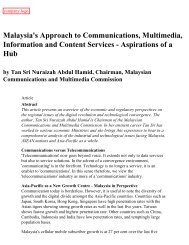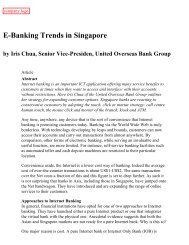Contents - Connect-World
Contents - Connect-World
Contents - Connect-World
You also want an ePaper? Increase the reach of your titles
YUMPU automatically turns print PDFs into web optimized ePapers that Google loves.
Billing<br />
Real-time billing makes its mark in emerging markets<br />
by Yossi Shabat, Comverse, Division Vice President, Asia Pacific<br />
The Asia-Pacific region makes use of real-time billing that lets operators handle credit<br />
and debit-based usage for their entire customer base. By reducing subscriber bad debt<br />
risk, real-time billing, lowers costs and assures revenues. Real-time service authorisation,<br />
monitoring, tariffing, charging and account updating are basic functions, which<br />
make prepaid systems possible. Consequently, they make possible most of the mobile<br />
services in the developing regions of the world. Real-time billing lets emerging markets<br />
enjoy the same services available in developed markets.<br />
Mr Shabat is Comverse Division Vice President for the Asia-Pacific region. Mr Shabat has worked for<br />
over 10 years leading business efforts in Greater China, Australia, South East Asia and India. Currently,<br />
Mr Shabat is the Vice President of Indo-China, managing seven offices in the region and an extensive<br />
R&D Centre in ShenZhen.<br />
Previously, Mr Shabat worked for such innovative technology companies as Apple Computers, Orbotech<br />
and Applied Material.<br />
Mr Shabat holds an MBA from the University of Tel-Aviv.<br />
Billing, spearheaded by the arrival of<br />
real-time billing systems, is now a<br />
dynamic force with strategic implications<br />
and major repercussions for<br />
operators worldwide. For one, it<br />
drives profitability by creating new<br />
revenue opportunities and cutting<br />
costs. At the same time, it intensifies<br />
an already highly competitive environment<br />
by enabling operators to offer a<br />
basket of advanced data services to<br />
target markets. Operators and subscribers<br />
in emerging markets, including<br />
those in the Asia-Pacific region,<br />
are among those enjoying the powerful<br />
benefits of real-time billing.<br />
New revenue opportunities<br />
The development of next-generation<br />
billing can be attributed to several factors.<br />
In the current age of instant gratification,<br />
subscribers are attracted to<br />
the availability of new data services<br />
that offer instant information, instant<br />
entertainment, instant communication<br />
and instant purchases. To complete<br />
the circle, however, subscribers<br />
need to know instantaneously the status<br />
of their account and the cost of<br />
such servicesfeatures that real-time<br />
billing provides.<br />
Second, promotions and discounts are<br />
becoming increasingly popular tools<br />
for stimulating additional mobile<br />
usage, particularly in the prepaid<br />
world. However, this can be accomplished<br />
only if the billing system is<br />
dynamic, flexible and able to react<br />
without delay.<br />
Third, operators can seize the opportunity<br />
of impulse buying, which is critically<br />
dependent on prompt action.<br />
For example, if subscribers purchase a<br />
musical ringtone of a specific artist,<br />
there is a good chance they might buy<br />
a music video from that same artist,<br />
particularly if they receive a brief trailer<br />
or are offered a discount immediately.<br />
The potential for additional revenues<br />
is substantial if operators can<br />
seize the moment via real-time<br />
billing systems.<br />
Cost-cutting tool<br />
With operators looking to lower the<br />
risk of bad debt among subscribers,<br />
real-time billing is a godsend. Banks<br />
have long recognised the need for realtime<br />
purchase authorisation and<br />
charging to a credit card account.<br />
Now, mobile providers can for the first<br />
time operate based on managed risk<br />
principles rather than on trust.<br />
With revenue leakage proving to be<br />
more damaging than ever, real-time<br />
billing can reduce the extent of losses,<br />
since circuitous CDR (Call Detail<br />
Recording)-based processes can be<br />
replaced by real-time equivalents.<br />
With real-time billing, operators can<br />
handle credit and debit usage-based<br />
billing for their entire customer base,<br />
leading to lower costs and assured revenues.<br />
A paradigm shift<br />
Real-time billing is no longer a dream.<br />
In fact, it already serves as the foundation<br />
of prepaid billing, which in many<br />
markets worldwide represents the<br />
dominant payment method.<br />
Real-time service authorisation and<br />
monitoring, tariffing and charging and<br />
account updating are basic functions<br />
in most prepaid systems.<br />
However, few companies have adapted<br />
prepaid systems to address their<br />
non-prepaid market and even fewer<br />
61
















